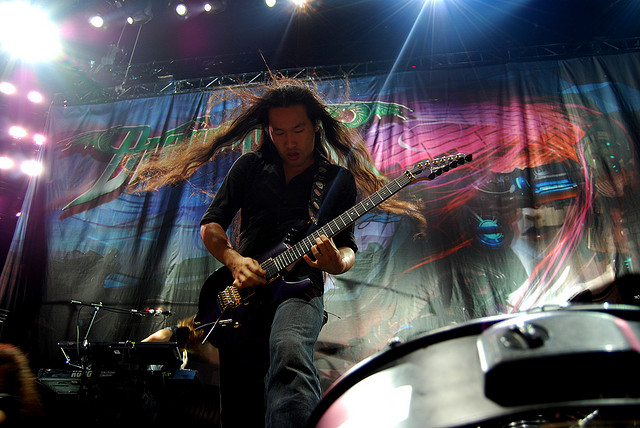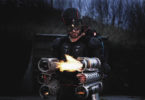What do power metal guitar, Wing Chun and Brazilian jiu-jitsu have in common? That’s a question not many people are qualified to answer – apart from Herman Li. Li is one of two lead guitarists for Dragonforce, the British band who exploded into popular culture when their most insanely solo-packed song, Through The Fire And The Flames, appeared in Guitar Hero 3. They’ve just released their sixth studio album – in which Li’s style continues to evolve, even though he’s constantly touring, producing, and learning martial arts. Herman Li, in other words, lives hard. So when my good friend Lorenzo Fraquelli, founder-owner of Chiswick BJJ, said he was teaching him, I asked if we could have a chat. And we did – about flow, the 10,000 rule, and why you should learn to talk to people, among other things…
Live Hard: Okay Herman – so if I’ve got this right, you practise Wing Chun, judo and BJJ, you’re a producer, you’re in a successful band, and you are insanely good at guitar. How do you have time?
Herman Li: Well, the short answer is that it’s better to do all that than spend time watching most programmes on TV or reading other people’s Facebook streams. You’ve got to remember that we live to do things. If you can turn something you do to relax or for enjoyment into something where you learn or improve…that’s key, that’s kind of the way I see the whole thing.
What’s a typical day like for you at the moment?
Well, there’s no such thing as typical, but for the last ten days I’ve been rehearsing. I get up, spend an hour doing whatever, then play the guitar for four, five six hours…have an hours’ break and then do another two or three hours. That’s not totally typical, but that’s what I’m doing right now.
Are you familiar with the idea of the 10,000 hour rule?
No, not really.
It’s this idea that anyone who puts a certain amount of disciplined practice into any technical field can become an expert in that field, and that it’s basically impossible to become an expert *without* a certain amount of practise. The 10,000 hours bit is slightly discredited, though.
Well, I think that hard work is better than talent, absolutely. Talent, I think, can make you lazy, because you learn really quickly. I feel like…I always say that I’m not that great a guitar player, anyone can do this if they spend the time on it. To be honest, I think anyone can do pretty much anything these days – with the knowledge, the information that’s out there on the internet, you don’t have to rely on people for a lot of things any more. In everything from martial arts to cooking, I’ve learned that it’s better when you don’t have to rely on someone else – you can find that knowledge and deal with the problem yourself.
Another idea that’s popular at the moment is the idea of ‘deliberate practice’ – concentrating hard on every moment you learn, and pushing outside your comfort zone. How does that square with your experience?
Well, for me, when it comes to learning something new, I’m not just disciplined, I’m a perfectionist. I don’t half-learn techniques. I certainly think you can get to a certain level without doing that, but to really push into the higher levels of something, you need to invest the time, you need the hours – beyond what you’re already doing. To get to a decent level might take ten hours, but to get to a really good level might take 100. The curve can steepen really suddenly, and you’ve got to be ready for that.
So how do you stay motivated when even tiny improvements take dozens of hours of practice?
Fortunately, there are so many great musicians doing something different from me. Music’s not a competition, which is great because there’s no loser – there’s only winning. But it does make you go ‘Oh, I want to get better.’ Seeing people doing different things from you should motivate you to be constantly evolving, to never stop learning.
What do you think the things that successful, productive people have in common are?
I think most successful people do their own thing. So nobody copies each other so much. I think Dragonforce have a unique sound, and that comes from doing our own thing. You have to learn to learn to teach yourself and you have to learn to process information, because there comes a point where you can’t succeed simply using things you’ve been taught. Everyone who teaches comes in with preconceived rules, and you need to find out what works for you.
Having said what I said about Facebook earlier, I think one thing that some very technical people can neglect is the social side of things. You’ve got two extremes. You’ve got the guy who obsesses over what he wants to be good at, and doesn’t bother learning social skills whatsoever. I admire anyone who can do that. But then you’ve got people who are really good at talking to people. You see that a lot of time in different jobs – you’ve got the guy at the top who’s really good at talking to people but has no technical skills, and everyone under him’s going ‘Oh wow, what an arsehole.’ But to be honest, you have to learn both skills – to some extent, you’re going to have to dilute one with the other. I did my time going ‘I don’t care about socialising, I need to learn the guitar,’ but then the other stuff came later, when I was touring and going all around the world, talking to people. You have to be able to talk to people, whatever your job is.
It’s interesting that you say that. I made a conscious decision to get better at talking to people when I was in my 20s, and I feel like it improved my life in a lot of ways – in learning, not just socially…
Yes, exactly. And to some extent, it’s like learning a different language – within one language, you have to learn to interact with logical people, with emotional people, how to deal with different types of people. And then, once you start teaching some kind of art, that’s what really tests your ability to do that.
Speaking of different arts, let’s talk about fighting. How did you get into that?
The science of it is what attracts me. It’s about physical, kinetic energy, how the body moves. Obviously I watched Bruce Lee and Jackie Chan movies when I was young and I was like ‘Oh, that’s badass, I want to be able to move like that.’ But later on, when you study it, you find that there’s such amazing science to it. When I was a kid in Hong Kong my parents thought fighitng was for thugs, they didn’t see the artistic side of it.
As far as BJJ goes, started with Lorenzo [Fraquelli] when we were both white belts, now he’s a black belt and I’m still blue. I need to keep moving to get to that extra level.
Do you find time to practice on tour?
Yeah, a few years ago I had a sound guy on the tour who was a kung fu guy, but also did wrestling, and my drum tech guy did kickboxing and MMA, so I had mats and we’d train kickboxing, jiu-jitsu, all that. For some reason, no-one in other bands was doing that at the time, but now I go on tour and lots of people are doing it. Matt Heafy from Trivium just got his blue belt. He’s only been training for a year but he’s been insane about it, he’s got the jiu-jitsu bug where you do it every day. Zoltan from Five Finger Death Punch trains too, he’s a black belt judoka. The first time he trained jiu-jitsu was with me on tour, and now he brings black belts with him on tour to train with. I’m not quite as serious as that yet, but it would be cool.
Do you think that being an expert in one field – guitar, say – helps you master the learning process you need for another?
Well, when I started BJJ I was getting choked out left and right and throwing up, which isn’t really a problem in guitar. But really it’s the mentality and the discipline – you already know how to learn, and that discipline plays a huge part in it. When I was first learning Wing Chun, they were obsessive about details – they’d yell at you when a hand was out of place. And that’s got a lot in common with the way I practice guitar, where I’m looking to be technically perfect at everything. You learn to break things down, to visualise and apply, to re-apply. You train your brain to learn, you train yourself to absorb techniques.
And do you actually enjoy it all? One thing that goes slightly against the ‘deliberate practise’ mantra is the idea of ‘flow’ – that actually, trying to find a practise state that feels fun and effortless is the key to fast progress. What are your thoughts on that?
Pretty much with everything I do I feel like the hours just disappear off the planet. It’s a great zone to be in because you’re not aware of the future, the past, you’re focused. But not everything can be fun, unfortunately. It’s like if you’re doing conditioning for martial arts – I don’t think anyone enjoys that. And certain techniques for the guitar are like that – when you’re learning them for the first time, there’s no fun in it. It’s only once you’ve learned them that the fun can really start.
Herman, it’s been a pleasure, and the album is awesome. Thanks very much.
No problem, thanks for some interesting questions. Hopefully I’ll see you at the gym.
HOMEWORK: Listen to new Dragonforce album Maximum Overload, out today. And re-read How To Talk To Armed Policemen: because talking to people is an essential life skill. Herman Li says so.






Leave a Comment